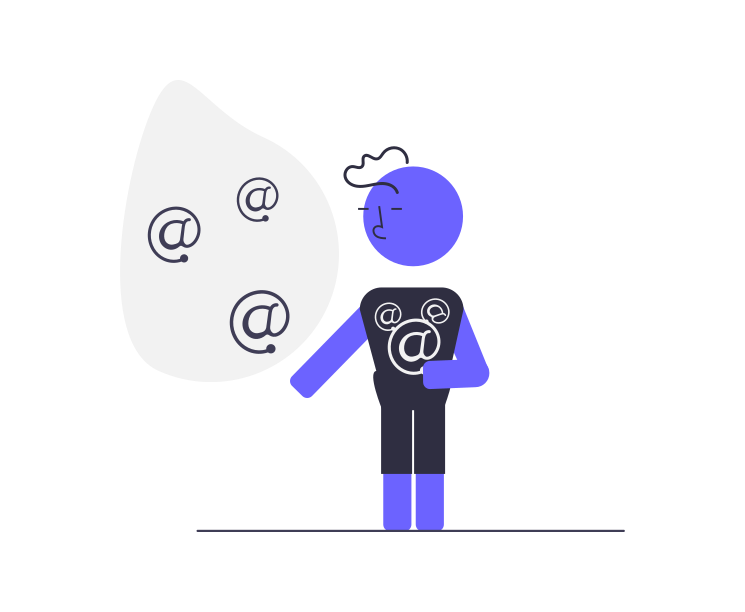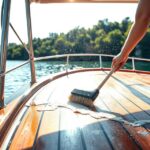Table of Contents
Houseboating is a fun way to enjoy the water, but it comes with its own set of rules. Whether you’re a pro or new to houseboating, knowing the etiquette is key. It makes sure everyone has a good time and stays safe.
In this guide, I’ll cover the most important do’s and don’ts. This will help you be a considerate and responsible houseboater. You’ll fit right in with the lake community.

Key Takeaways
- Familiarize yourself with pre-launch preparations and safety checks to ensure a smooth and secure outing.
- Brush up on navigational rules and right-of-way guidelines to avoid conflicts with other vessels.
- Understand the importance of noise management and quiet hours for a peaceful lake experience.
- Prioritize eco-friendly practices and proper waste disposal to protect the natural environment.
- Respect the shared nature of common areas and facilities to foster a harmonious community.
Essential Pre-Launch Preparations and Safety Checks
Before you start your houseboating adventure, make sure you’ve done all the necessary prep work. This careful planning ensures a safe and enjoyable trip. You’ll get to enjoy the beautiful surroundings without worry.
Required Documentation and Licenses
First, check that you have all the right documents and licenses. You’ll need a valid boating license to operate the houseboat safely. Also, make sure the houseboat is properly registered and has all the necessary paperwork.
Safety Equipment Checklist
- Life jackets for all passengers
- Fire extinguishers
- Flares and signaling devices
- First-aid kit
- Navigational equipment (compass, charts, GPS)
- Communication devices (radio, phone)
Go through the safety equipment checklist carefully. Make sure everything is in good working order and easy to find in an emergency.
Weather Monitoring Guidelines
It’s important to watch the weather closely for a safe houseboating trip. Check the forecast before you go and be ready to change plans if needed. Be alert for any sudden weather changes that could affect your trip.
By doing these essential safety checks and preparations, you can start your houseboating adventure with confidence. You’ll be ready for anything that comes your way. This will make your Lake Life experience unforgettable and fun.
Boat Ramp Etiquette and Launch Protocol
Launching your houseboat is a key moment. It needs a smooth and considerate approach. Keeping boat ramp courtesy and following launch protocol ensures a good experience for everyone.
Before you get to the boat ramp, take a moment to look around. See how traffic is moving and wait for your turn. This shows respect and helps keep the waterway access smooth for all.
When it’s your turn, be ready. Have your boat untied, engine on, and crew ready. Load your gear quickly and get going, letting others follow without delay. Don’t take up too much space on the ramp, as this can slow things down for others.
The boat ramp is for everyone. Being courteous and following launch protocol helps make your houseboating trip great. It also keeps peace among all waterway users.
| Boat Ramp Etiquette Dos | Boat Ramp Etiquette Don’ts |
|---|---|
| Wait your turn patiently Have your boat ready to launch Load gear efficiently Clear the ramp as soon as your boat is in the water Assist others when appropriate | Monopolize the ramp Leave your vehicle and trailer unattended Block the ramp with your vehicle or trailer Impede the flow of traffic Engage in reckless behavior |
By showing boat ramp courtesy and following launch protocol, you help make the waterway access better for everyone. A little thoughtfulness makes the start of your houseboating trip smoother and more enjoyable.
Navigating Waterways and Traffic Rules
When we share the waterways with other boaters, we must follow certain rules. It’s important to know the right-of-way, speed limits, and how to communicate. This ensures a safe and fun trip for everyone.
Right of Way Guidelines
Waterway navigation is like driving on the road. There are rules for who goes first. Motorized boats usually go first, while sailboats and kayaks go second.
When you see another boat, think about where they’re going and how they can move. Then, you know what to do.
- Overtaking vessels must pass on the starboard (right) side of the boat being overtaken.
- Vessels approaching head-on should pass each other port-to-port (left-to-left).
- Sailboats under sail have the right of way over powerboats, except when the powerboat is restricted in its ability to maneuver.
Speed Limits and Wake Zones
It’s important to drive your houseboat at a safe speed. This keeps everyone on the water safe and comfortable. Speed limits vary by area to fit different activities and boats.
- Follow the posted speed limits, usually in miles per hour (mph) or knots.
- Slow down in “no wake” zones to avoid disturbing others and the shore.
- Adjust your speed and wake when passing by docks, marinas, or busy areas.
Communication with Other Vessels
Good communication is key to safe and polite boating. Use different ways to show your plans and understand others. This helps avoid accidents and keeps traffic moving smoothly.
- Sound your boat’s horn or whistle to show you’re there and where you’re going.
- Keep a close eye out and make eye contact with other boaters to share plans.
- Use hand signals or talk if you need to coordinate or avoid trouble.
Knowing these rules helps us enjoy houseboating safely. Being considerate and responsible benefits us and the whole boating community.
Houseboating Etiquette: Do’s and Don’ts
Houseboating on the lake is a cherished pastime. It offers a unique chance to reconnect with nature and make lasting memories.
To ensure a positive experience for all, it’s important to follow proper etiquette and respect the shared waterways. We’ll explore the do’s and don’ts of houseboating, helping you be a considerate and responsible lake enthusiast.
The Do’s of Houseboating Etiquette
- Maintain a respectful volume: Avoid blasting music or creating excessive noise that could disturb other boaters and nearby residents.
- Properly dispose of waste: Ensure all trash and sewage are disposed of in designated areas, adhering to environmental regulations.
- Respect the speed limit: Observe the posted speed limits and be mindful of your wake, preventing damage to other vessels and shorelines.
- Communicate with fellow boaters: Use hand signals, horns, or radio communication to coordinate your movements and avoid collisions.
- Secure your houseboat: Properly tie up your vessel when docking or mooring to prevent it from drifting and causing harm to other boats.
The Don’ts of Houseboating Etiquette
- Don’t litter or pollute the water: Refrain from throwing any waste, including cigarette butts, overboard, as this can harm the delicate lake ecosystem.
- Avoid reckless driving: Steer clear of aggressive maneuvers, such as sudden turns or high-speed passes, which can endanger other boaters and swimmers.
- Don’t monopolize common areas: Be mindful of sharing docks, ramps, and other facilities with other lake users, and be considerate of their needs.
- Refrain from excessive noise: Keep your music, celebrations, and conversations at a reasonable volume, respecting the tranquility of the lake environment.
- Don’t anchor or moor in prohibited areas: Familiarize yourself with the designated anchoring and mooring zones to avoid interfering with navigation or causing disturbances.
By following these houseboating etiquette guidelines, you can ensure a safe, enjoyable, and harmonious experience for everyone on the lake. Remember, the key to a successful houseboating adventure is respect, consideration, and a shared commitment to preserving the natural beauty of the waterways.
| Houseboating Etiquette Do’s | Houseboating Etiquette Don’ts |
|---|---|
| Maintain a respectful volume | Don’t litter or pollute the water |
| Properly dispose of waste | Avoid reckless driving |
| Respect the speed limit | Don’t monopolize common areas |
| Communicate with fellow boaters | Refrain from excessive noise |
| Secure your houseboat | Don’t anchor or moor in prohibited areas |
By following these guidelines, you can ensure a safe, enjoyable, and harmonious experience for everyone on the lake. Remember, the key to a successful houseboating adventure is respect, consideration, and a shared commitment to preserving the natural beauty of the waterways.
“Houseboating is not just about the destination, but the journey itself. Embrace the experience with care and consideration for others.”
Docking and Mooring Best Practices
Exploring the calm waters of a lake or river in a houseboat is a joy. But, mastering the art of docking and mooring is key for a smooth lake life. Knowing the right docking etiquette, mooring practices, and anchoring guidelines helps avoid conflicts and ensures safety for everyone.
Proper Line Handling
Slowly and carefully approach the dock or mooring area, watching for other boats or obstacles. When docking, use your lines to secure your houseboat without damaging the dock or your boat. Make sure your lines are in good shape and long enough for changing water levels or wind.
Anchoring Techniques
Anchoring your houseboat can offer a private and secluded spot. But, it needs the right techniques for a stable and secure mooring. Pick a spot with enough depth and a solid bottom, and use enough anchor scope to prevent drifting. Always check your anchor and adjust it to keep your boat secure.
Space Consideration
When docking or mooring, think about the space your houseboat needs and how close you are to others. Make sure you have enough room to move and don’t block your neighbors’ docking or mooring spots. Be friendly and considerate when sharing dock or mooring space with others.
By following these docking, mooring, and anchoring best practices, you can have a safe and fun lake life. Always put safety first, respect the waterways, and enjoy the houseboat community’s camaraderie.
Noise Management and Quiet Hours
Keeping the lake peaceful is key for all houseboaters. The open waters are exciting, but we must watch our noise levels. Quiet hours and noise control help make sure everyone has a good time.
Establishing Quiet Hours
Lake communities often have quiet hours from 10 PM to 7 AM. It’s important to keep the noise down during this time. This includes music and generators. Quiet hours are part of houseboat etiquette, helping everyone relax.
Noise Control Strategies
- Use sound-dampening materials and tech on your houseboat to reduce noise.
- Try not to use loud generators or equipment during quiet hours.
- Talk to other boats about noise control and respecting personal space.
- Tell your guests to keep their volume low and avoid loud activities during quiet times.
Being considerate and managing noise helps make houseboating enjoyable for everyone. Quiet hours and noise control are important for a peaceful lakeside community.

Waste Disposal and Environmental Responsibility
As houseboaters, we play a key role in keeping our waterways beautiful. We must focus on proper waste disposal and caring for the environment. This is important during our time on the lake.
Proper Sewage Handling
Handling sewage correctly is vital for a clean lake. Always use designated pump-out stations for waste disposal. Never dump waste directly into the water. This protects the environment and follows local laws.
Trash Management
Keeping our boat and the area around it clean is important. Use enough trash bins on board and dispose of waste properly. Try to recycle as much as you can. Leave no trace of your visit to the lake.
Eco-Friendly Practices
- Choose eco-friendly cleaning products that are safe for the water.
- Reduce water use and consider water-saving appliances for your boat.
- Use renewable energy like solar panels to power your boat.
- Learn about sustainable boating to reduce your impact on the environment.
By following these waste management and environmental care tips, we can enjoy the lake while keeping it healthy. This way, we ensure the beauty of our waterways for future generations.
“The health of our waters is the principal measure of how we live on the land.” – Luna Leopold
Sharing Common Areas and Facilities
Being a responsible houseboater means being mindful of shared spaces in the marina. It’s about navigating docks and using onshore amenities with care. A little etiquette can make everyone’s experience better.
Respecting others in common areas is key to marina etiquette. Whether walking the docks, waiting for the restroom, or chatting in the lounge, be aware of your space. Avoid taking over or causing trouble.
Using shared facilities like laundry, pump-out, or fueling areas needs care. Stick to the rules, clean up, and let others wait their turn. This keeps things smooth for everyone.
- Be considerate and polite in common areas of the marina.
- Follow the rules for shared facilities for everyone’s benefit.
- Keep noise down, mainly during quiet hours, to respect the marina’s peace.
Embracing cooperation and kindness helps make the marina a better place for all. We’re all in this together. A bit of thoughtfulness can greatly enhance your houseboating journey.

Night Navigation and Anchoring Protocol
As the sun sets, navigating your houseboat at night needs extra care. Good lighting is key for safe travel. It makes you visible to others and helps you see around you.
Proper Lighting
Your houseboat must have the right lights for night travel. This includes masthead, stern, and side lights. Make sure these are working and on when it gets dark. Also, use a spotlight or floodlight to light up your area when moving in crowded places or docking.
Overnight Mooring Guidelines
When night falls, pick a safe spot to moor. Stay away from narrow channels and busy areas to avoid blocking others. Look for designated spots or quiet coves for anchoring. Make sure your anchor is set right and lines are tight to keep your boat safe from drifting or hitting others.
FAQ
What are the essential pre-launch preparations and safety checks I should perform before setting out on my houseboat?
Before you launch your houseboat, make sure you have all the necessary documents and licenses. Also, check your safety equipment and know the weather. These steps will help ensure a safe journey for you and your crew.
How should I approach the boat ramp and launch my houseboat while being considerate of other boaters?
When you get to the boat ramp, be polite and let others go first. Load your houseboat quickly and then leave the ramp area. This way, everyone has a good experience.
What are the key navigation rules and traffic guidelines I should follow while operating my houseboat on the waterways?
Follow the right-of-way rules, speed limits, and wake zone rules. Also, communicate well with other boats. This keeps the waterways safe and peaceful for everyone.
What are some of the key do’s and don’ts of houseboating etiquette that I should keep in mind?
Houseboating etiquette means being considerate. Respect others’ space, keep noise down, and dispose of waste properly. These actions make sure everyone has a good time.
How should I approach docking and mooring my houseboat to avoid conflicts with other boaters?
When docking, handle your lines carefully and anchor well. Think about the space you need and that of others. This way, docking is smooth and peaceful for everyone.
What are the guidelines for managing noise and maintaining a peaceful environment on the lake?
Managing noise is key to houseboating etiquette. Stick to quiet hours, keep music low, and respect others’ space. This helps keep the lake peaceful for everyone.
What are the proper procedures for handling waste and upholding environmental responsibility while houseboating?
Handling waste and being eco-friendly are important. Properly dispose of sewage and trash, and use eco-friendly practices. This helps protect the lake’s ecosystem.
How should I approach sharing common areas and facilities, such as marinas and docks, with other houseboaters?
When using shared spaces, be cooperative and considerate. Think about others’ needs, follow rules, and aim for a friendly environment for all.
What are the best practices for navigating and anchoring my houseboat during nighttime hours or in crowded areas?
Use proper lighting and navigate carefully at night or in crowded areas. Follow mooring rules and stay alert. This ensures safe and respectful night navigation.




Pingback: Smart Tips for Organizing Small Spaces on a Houseboat oceangrandeur.com
Pingback: Tips for Traveling with Kids on a Houseboat oceangrandeur.com